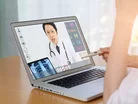5G tech could enable bowel cancer detection at home

An innovative new pilot scheme could enable patients to have a procedure that detects bowel cancer in the privacy of their own homes.
The pilot has has launched in England, and will allow patients awaiting an endoscopy (a procedure whereby a camera is fed into the bowel through a thin tube to detect signs of issues such as cancer) to undertake a similar, less invasive procedure, without having to visit a hospital.
Using 5G technology, a pill-sized camera could be used to deliver a colon capsule endoscopy (CCE) at home under medical guidance. The project will develop the CCE Smartbox, which will both capture and transmit images of the bowel without the need for a hospital setting.
As well as real-time transmission of the images captured, faster 5G internet will also enable the use of a virtual assistant that can provide answers and guidance to the patient while clinicians track and monitor the equipment throughout the process.
The partners behind the pilot are West Midlands 5G, NHS Arden and GEM Commissioning Support Unit, University Hospitals Coventry and Warwickshire, and tech company CorporateHealth International.
Although this kind of device has been available to patients for around 15 years, self-administration at home has not yet been trialled at scale. With 5G connectivity the hope is to make more widespread adoption of this technology possible, which will also help to reduce the backlog of endoscopy procedures built up during the pandemic.
Ramesh Arasaradnam OBE, Senior gastroenterologist at University Hospitals Coventry and Warwickshire, said: “Bowel cancer is the second biggest cancer killer in the UK with around 20,000 deaths each year. We also know that if detected early, the prognosis is good.
“Each year, over 2 million endoscopies are scheduled to take place through the NHS, but the level of demand combined with limited clinical capacity has resulted in a backlog. This has been exacerbated by COVID-19 as endoscopy rooms require additional cleaning between procedures, limiting the number of appointments that can be handled in a day.
“Through the application of 5G technology, it is feasible that patients can swallow the capsule and undertake the whole process in the comfort of their own homes. As we strive to build the evidence base, we believe that many of these procedures could potentially be undertaken each year easing the burden on the NHS and reducing stress and uncertainty for patients.”



